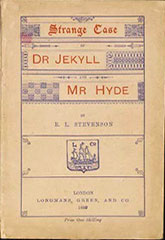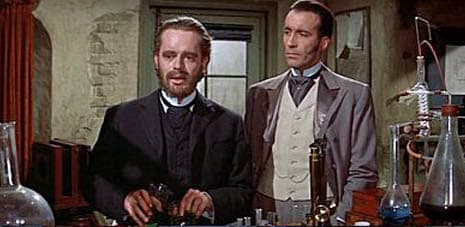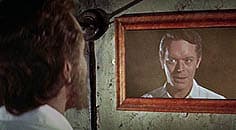Strange Case of Dr Jekyll and Mr Hyde
Critique • Quotes • Text • At the movies
 First edition
First editionFirst publication
1886
Literature form
Novella
Genres
Literary, science fiction, horror
Writing language
English
Author's country
Scotland
Length
Approx. 24,500 words

Christopher Lee is another kind of monster, having an affair with Jekyll's (Paul Massie's) wife.
Drugs will do that to you, doctor
The Two Faces of Dr. Jekyll (1960): Also known as House of Fright, film, 88 minutes; director Terence Fisher; writer Wolf Mankowitz; featuring Paul Massie, Dawn Addams, Christopher Lee
In the post-war years Britain's Hammer Studios remade many of Hollywood's great genre films—like the Frankenstein, Dracula and the Sherlock Holmes series—turning black-and-white thrillers into richly coloured, psychologically nuanced melodramas. In 1960 they got around to the Robert Louis Stevenson classic with The Two Faces of Dr. Jekyll.
It was oddly cast, with the clean-cut, Canadian-born actor Paul Massie taking the Jekyll-and-Hyde role and the usually monstrous Christopher Lee as an elegant wastrel having an affair with Jekyll's wife. (Yes, the not-always-good doctor is married in this adaptation.)
 And here's a further switcheroo. Going against cinematic tradition, the clean-cut version of the lead actor is actually the wicked Hyde, while the darker, more hirsute version is Jekyll.
And here's a further switcheroo. Going against cinematic tradition, the clean-cut version of the lead actor is actually the wicked Hyde, while the darker, more hirsute version is Jekyll.
Dr. Jekyll has the usual bubbling lab but instead of drinking a steaming potion he injects himself in the arm with a hypodermic. The puncture happens just out of camera range as does the transformation, so we never get to see exactly how a drug gives him an instant shave and haircut. (Though to be fair, it never made sense in earlier adaptations that a potion would grow instant facial hair and crooked teeth, which would retreat when the drug wore off.)
Also going against tradition, it turns out the doctor is not such a saint and the mister not so masterful. Massie takes a while to grow on you but he does pull it off, especially when his two identities are fighting for supremacy in one body and the actor has to rely on voice and mannerism to suggest two distinct personalities.
The plot seems to be a mishmash of previous movie ideas, going far beyond Stevenson's short novel, much of it involving cruel treatment of women. But it's updated with more explicit sexuality than had been seen previously. All lead characters, including the philandering wife (Dawn Adams) and the other man (Lee) show moral ambivalence, shifting audience sympathies back and forth. It's a surprisingly modern film—which may be why it was not one of Hammer's bigger hits in 1960.
It probably also didn't help that it was lumped in with other Hammer product as a horror film. At one time it was even presented to an American audience as House of Fright. Not too scary. Except perhaps as a warning against drug abuse.
Jekyll speaks some of the usual twaddle about his experiments seeking to reveal the split nature of human beings, but from his demonstration, first with a monkey and inevitably with himself, it's obvious we're talking about some kind of drug that speeds up metabolism. Maybe like methamphetamines. And he becomes addicted to it.
Near the end he goes on a wild-eyed, murderous rampage that could have been used in that hysterical anti-drug flick, Reefer Madness.
At one point the film briefly raises the issue of whether a person is responsible for his body's behaviour when controlled by a hidden personality. Or, that is, when you're stoned—if you buy my interpretation. However, it never resolves this, or any other question raised in the complicated story, which has little to do with Stevenson's original tale.
Oh yes, it does throw in the usual warning about scientists playing god, as if that may be a lesson we're supposed to take from this mess.
But it's a fun mess. Produced a few years later in the 1960s it might have been accepted as high camp. A parody of sorts. A parody of past Jekylls and Hydes, and a few to come.
— Eric

